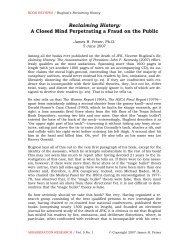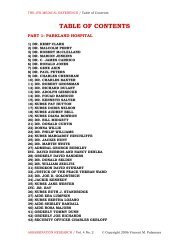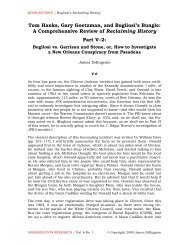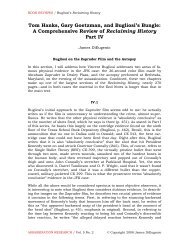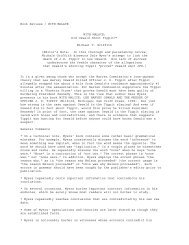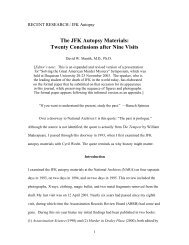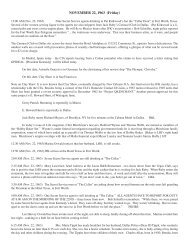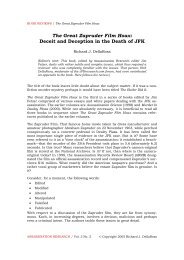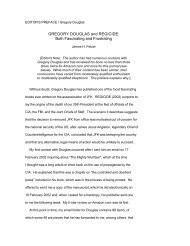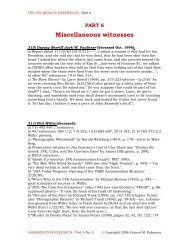A Comprehensive Review of Reclaiming History Part VIII
A Comprehensive Review of Reclaiming History Part VIII
A Comprehensive Review of Reclaiming History Part VIII
You also want an ePaper? Increase the reach of your titles
YUMPU automatically turns print PDFs into web optimized ePapers that Google loves.
James DiEugenio 22 Bugliosi’s Bungle, <strong>Part</strong> <strong>VIII</strong><br />
tion was deemed as frustrating the Russians or keeping a country pro-western,<br />
it was given the go-ahead. Approval was almost always a “pro-forma” matter,<br />
done over lunch by a small inner group. The result was that “no one, other than<br />
those in the CIA immediately concerned with their day to day operation, has<br />
any detailed knowledge <strong>of</strong> what is going on.” This meant that the CIA’s covert<br />
action arm exerted unilateral influences on American foreign policy—and, at<br />
times, not even the US ambassador in country knew about it beforehand (ibid.).<br />
The writers believed that what had happened “could not possibly have [been]<br />
foreseen” in the legislation <strong>of</strong> 1947 and 1948. And they blamed lack <strong>of</strong> oversight<br />
as being “responsible in a great measure for stirring up the turmoil and raising<br />
the doubts about us that exist in many countries <strong>of</strong> the world today.” (ibid.)<br />
The report also pointed out that the way that Dulles organized the CIA allowed<br />
covert action programs to consume 80% <strong>of</strong> the budget (ibid., p. 476). Furthermore,<br />
the National Security Council (NSC) exercised little or no control over covert<br />
action. The CIA’s Directorate <strong>of</strong> Plans “is operating for the most part on an<br />
autonomous and free-wheeling basis in highly critical areas.” (ibid.) At times,<br />
this was truly lamentable, since “the operations being carried out by the Deputy<br />
Director <strong>of</strong> Plans are sometimes in direct conflict with the normal operations<br />
being carried out by the Department <strong>of</strong> State.” (ibid.) Schlesinger adds that a<br />
perfect example <strong>of</strong> this was the CIA coup attempt against Sukarno in Indonesia<br />
the year after the report. John Allison, the ambassador, opposed the coup attempt—so<br />
Allen had his brother at State remove Allison. The new ambassador<br />
was kept largely in the dark about the CIA plans. The coup failed, greatly alienating<br />
Sukarno from the U.S. Lovett and Bruce—and Joseph Kennedy, who was<br />
also on the advisory board—continued to press their case against Dulles until<br />
they left. In their last report, they wrote that “the CIA’s concentration on political,<br />
psychological, and related covert action activities have tended to detract<br />
substantially from the execution <strong>of</strong> [a] primary intelligence-gathering mission.<br />
We suggest, accordingly, that there should be a total reassessment <strong>of</strong> our covert<br />
action policies.” (ibid., p. 477)<br />
Lovett told the Cuban board, “I have never felt that the Congress <strong>of</strong> the United<br />
States ever intended to give the United States Intelligence Agency authority to<br />
conduct operations all over the earth.” (ibid.) Lovett’s report and testimony held<br />
great sway with the Kennedys; in fact, Joseph Kennedy was so impressed by<br />
working with Lovett that he urged JFK to <strong>of</strong>fer him a top job in his Cabinet. After<br />
his Bay <strong>of</strong> Pigs testimony, President Kennedy called Lovett in for a private<br />
meeting. He told the president that the CIA was “badly organized, dangerously<br />
amateurish and excessively costly”. It had to be re-organized, which wasn’t<br />
possible with Eisenhower as President and Dulles as Director (ibid., p. 478).<br />
There can be little doubt that Lovett’s testimony and his relationship with Kennedy’s<br />
father helped convince JFK to fire Allen Dulles. How important was it?<br />
Lovett’s influence was so pr<strong>of</strong>ound that after JFK fired Dulles, Robert Kennedy<br />
was determined to find out if any other relative <strong>of</strong> Dulles was still at the State<br />
Department. When he found out that Allen’s sister Eleanor worked there, he<br />
ordered Dean Rusk to fire her, because “he didn’t want any more <strong>of</strong> the Dulles<br />
family around” (Mosley, p. 473).<br />
ASSASSINATION RESEARCH / Vol. 6 No. 1 © Copyright 2009 James DiEugenio



